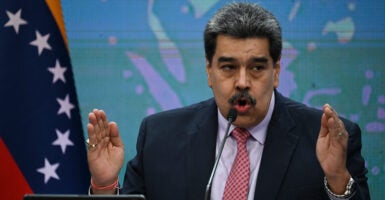Over the Thanksgiving holiday weekend, the Biden administration announced an easing of sanctions on Venezuela. With the midterm elections safely behind President Joe Biden, the administration likely hoped that Americans would be too busy finishing their turkey dinners to notice the administration’s latest turkey—a giveaway to Venezuela.
The Treasury Department issued limited sanctions relief for oil production in Venezuela, following talks in Mexico City between a sector of Venezuela’s opposition coalition, the “Unitary Platform,” and the South American nation’s illegitimate regime of Nicolas Maduro.
Sanctions relief for Venezuela is puzzling foreign policy. The U.S. does not recognize Maduro as the constitutionally elected president. According to a U.N. report this year, the regime is responsible for crimes against humanity, detaining and torturing at least 245 current political prisoners. The regime actively kidnaps American citizens, colludes with China and Iran to evade sanctions and harbor terrorist groups, such as Hezbollah, and uses its oil wealth to support and expand anti-American political projects in neighboring states.
It reveals yet again the incoherent inconsistencies of the Biden administration with respect to energy policies. Among them:
- Tacitly compromising with the Maduro regime on oil production (although it directly benefits from the state-owned oil industry), while condemning Russia’s weaponization of its energy supply and seeking to minimize Russia’s ability to profit from energy production.
- Turning a blind eye to the greenhouse gas emissions from Venezuelan oil production while banning federal financial and technical assistance for similar projects in other countries—on the basis of greenhouse gas emissions. The Wall Street Journal reminded readers of the Biden administration’s cold shoulder last year for pro-American, oil-rich Guyana’s seeking aid to develop its resources, while China fills America’s void.
- Allowing transactions to go through for Venezuela’s oil production, while aggressively pushing regulations across the U.S. financial sector to divert private capital away from the oil sector.
- Preferring oil imports over new production of abundant domestic oil resources. Oil from Venezuela certainly won’t strengthen American energy security in the long run, with Maduro being no friend of the U.S.
Regardless of the muddled messages, the administration went ahead anyway with sanctions relief. It entails two licenses from the U.S. Office of Foreign Assets Control granted to Chevron. They allow Chevron and its subsidiaries to complete the financial transactions necessary for oil production involving the state-owned Petroleos de Venezuela S.A. Another license authorizes transactions between the regime and four other U.S. firms.
On Tuesday, Venezuela’s top Chevron executive met with petroleum minister Tareck El Aissami, a regime power-player closely tied to Iran, to announce new joint ventures and renewed oil production.
Venezuelan law limits production to state or joint ventures, meaning newly unfrozen U.S. capital to rebuild production will have to flow to the regime-controlled state oil giant, even if the license purportedly prohibits certain payments to the Venezuelan state. Maduro and his cronies have embezzled billions of dollars from Petroleos de Venezuela in the past decade.
Meanwhile, the Biden administration is enabling an additional deal between the Maduro regime, a sector of the opposition, and the U.N. to unfreeze $3 billion in foreign bank accounts, but these could be managed by the regime itself, according to its representative in Mexico City.
While the administration attempts to justify the moves with the pretext of “concrete steps” toward democracy in Venezuela, the Maduro regime repeatedly uses opposition talks to buy itself time and concessions, and Biden knows it.
Additionally, the licenses prohibit the sale and export of oil to any country except the U.S. and also prohibit any expansion by Chevron into new ventures. This gives the impression that sanctions were lifted because the Biden administration needs Venezuelan oil.
What the administration needs is more U.S. oil. However, from proposing to block new offshore oil lease sales for the next five years to politicizing permits for new pipelines that enable more production to regulating the internal-combustion engine out of existence in 10 years, the Biden administration misguidedly wants to prevent new oil infrastructure and investments that would “lock in” future domestic production and frustrate the president’s green agenda.
This is the kind of thinking that got Europe into its energy crisis. Thinking it could subsidize and mandate a transition to renewables, kill its own oil (and coal, natural gas, and nuclear) production, and import the rest in the meantime, Europe only achieved a very expensive, import-reliant energy sector.
Russia’s reinvasion of Ukraine served to expose Europe’s folly.
Biden’s energy policy—that is, a myopic fixation on greenhouse gas mitigation as the “organizing principle” of policy—is not working. It has forced the president to make concessions that thwart the cause of freedom and enrich U.S. enemies through imports of resources that the U.S. and its allies have in abundance.
Instead, Biden is subsidizing Maduro’s regime by allowing its domestic resources to be directed to other malign uses.
The world needs more energy, but not from the likes of those who would weaponize it to make America and its neighbors less safe and free. The Biden administration’s decision to loosen sanctions on the illegitimate Maduro regime discredits and weakens the U.S.
Americans—and freedom-seeking people in Venezuela—deserve better.
Have an opinion about this article? To sound off, please email [email protected] and we’ll consider publishing your edited remarks in our regular “We Hear You” feature. Remember to include the url or headline of the article plus your name and town and/or state.































